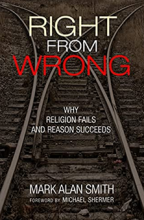Professor Mark Alan Smith recently finished an important and sure to be controversial new book,"Right From Wrong: Why religion fails and reason succeeds." This summary was prepared by our own Professor James Long.
_____________________________________________
Mark asks a simple question: "where does morality come from?" The answer(s) is, of course, not so simple!
He first looks to religion -- perhaps the most intuitive answer -- but rather than rehash what we all know, or think we know, about how specific religious teachings guide moral beliefs among believers, Mark does something different and novel. He looks at how contemporary religious "apologists" (scholars and religious leaders who engage in formal defenses of religion) comment on social problems and defend their moral reasoning based on their readings of religious texts (and justify this reasoning to their many followers/co-religionists).
Mark finds great hypocrisy and inconsistency in how apologists do this. How can contemporary Catholic, Protestant, and Muslim apologists reconcile the legacies of racism, murder, genocide, slavery, and the treatment of marginalized groups that appear in Judeo-Christian and Muslim texts with the problems we use morality to solve in the present around racism and racial inequality, gay rights, women's rights, etc.?
The short answer: they can't (!), but rather than respond to apologetic thinkers with the snide "gotcha" response from today's New Atheists, Mark instead takes these apologists at their word and approaches them on their terms. In what I consider a master class demonstrating their logical inconsistencies and lazy thinking, Mark essentially takes down every argument that modern day apologists can make and shows why they are wrong not only in their read of their own religious texts, but also why those texts would ultimately failed to guide morality in a reasonable, rational way today.
Not content to "tear down" but also to "build up," Mark then looks elsewhere for an answer as to where morality should and could arise from. His answer? Reason! But it's not just reason as a form of logic, but also the process by which reason helps society to deliberate over, and hopefully solve, many of its most pressing problems.
Adopting approaches from humanistic thinking and modern political theory, Mark develops his own variant based on what he terms "inclusive deliberation." Starting with something akin to Rawls's "Original Position" and "Veil of Ignorance," Mark believes that if we then deployed the tools of science, logic, civil debate, and what he calls "the fountain of knowledge" (the record of evidence we can call upon from history and expertise in the present) in a deliberative process that seeks to include those who have historically been excluded from, or harmed by, the body politic and its decision-making apparatuses -- well, we might not solve every issue today or in the future, but we will solve a great many!
But more importantly for Mark, we'll do so in ways that are more just, evidence-based, and humane than any process that apologists would recommend. That is, the brilliance in Mark's explication of his "inclusive deliberation" is not that he guides the reader to a specific answer of what society should determine on topics like racism, gay rights, or women's rights, but rather that he gives us the process by which we should decide. This provided me with many fun and interesting "thought experiments" I've raised with Mark, my students, other colleagues, and my family over the last few weeks.
Mark's book is a rather refreshing reminder that the tools our society needs to function and grow are not found in the dusty pages of the King James Bible, Joel Osteen's ThunderDome temple, or the manic Tweets of ideologues and poseurs on Twitter, but rather in the tools we've developed across societies throughout history and contributed to human betterment around the world: liberal democracy, reasoned discourse and debate, civility in public life, science and evidence-based policy making, and the human rights regimes adopted in global governance.
Beyond his deep dive into the primary sources and readings of historical and modern apologists, Mark's writing is clear, often funny, and a masterclass in steel-personing -- building up the best arguments from others only to eventually eviscerate them on their own terms. And fear not -- out of the dust of the many shibboleths that Mark has slayed comes the tool of inclusive deliberation that is as rigorous in its presentation and thinking as it is necessary in this current moment.
James D. Long
